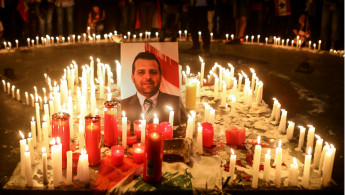Lebanon protester's death must be investigated by civilian prosecutors: Amnesty
Alaa Abu Fakhr, who was buried on Thursday in his hometown of Choueifat, southeast Beirut, died on Tuesday when an army officer opened fire as demonstrators blocked roads in the coastal town of Khalde south of Beirut.
The death of Abu Fakhr, aged 38 and a father of three, was strongly condemned by the rights group.
"Alaa's family has the right to know the full truth of what happened to him and to see those responsible for his killing brought to justice," said Heba Morayef, Amnesty International's Middle East and North Africa regional director.
"Only a fully independent court can bring justice to Alaa and his family, sending a signal that nobody is beyond accountability as protests continue," Morayef said.
"We call on the Lebanese authorities to immediately refer the investigation to the civilian justice system."
Abu Fakhr has been dubbed the "Martyr of the Revolution" by protesters who have taken to the streets since October 17 demanding the ouster of a generation of politicians they deem inefficient and corrupt.
He is the second fatality since the start of the demonstrations.
Twitter Post
|
Another protester, Hussein al-Attar, was shot early on in the movement as demonstrators blocked the airport road.
On Thursday protesters clashed in at least two places with security forces attempting to re-open blocked roads.
Television network LBC aired video footage appearing to show protesters in Taalbaya in the eastern region of Bekaa, throwing rocks and plastic chairs at soldiers, who do not respond.
The protest movement first erupted in opposition to a proposed tax on calls made via free phone apps, but it has since grown into a cross-sectarian outcry against everything from perceived state corruption to rampant electricity cuts.
Demonstrators say they are fed up with the same families dominating government institutions since the end of the 1975-1990 civil war.
The government stepped down on October 29 but stayed on in a caretaker capacity and no overt efforts have so far been made to form a new one, as an economic crisis has also battered the country.
Protesters have demanded a new government be composed of experts not affiliated with any of the traditional political parties.
But on Tuesday President Michel Aoun argued in a television interview that a government made up solely of independent technocrats would not represent the people or be able to set policies.
"Where should I look for them? On the moon?" he said, suggesting that Lebanese who did not see any decent person in power should "emigrate".
His words fuelled rage on the streets, with protesters saying they would press with their movement until their demands are met.
Agencies contributed to this report.
Follow us on Twitter and Instagram to stay connected





 Follow the Middle East's top stories in English at The New Arab on Google News
Follow the Middle East's top stories in English at The New Arab on Google News
![Israeli forces ordered bombed Gaza's Jabalia, ordering residents to leave [Getty]](/sites/default/files/styles/image_330x185/public/2176418030.jpeg?h=a5f2f23a&itok=_YGZaP1z)

